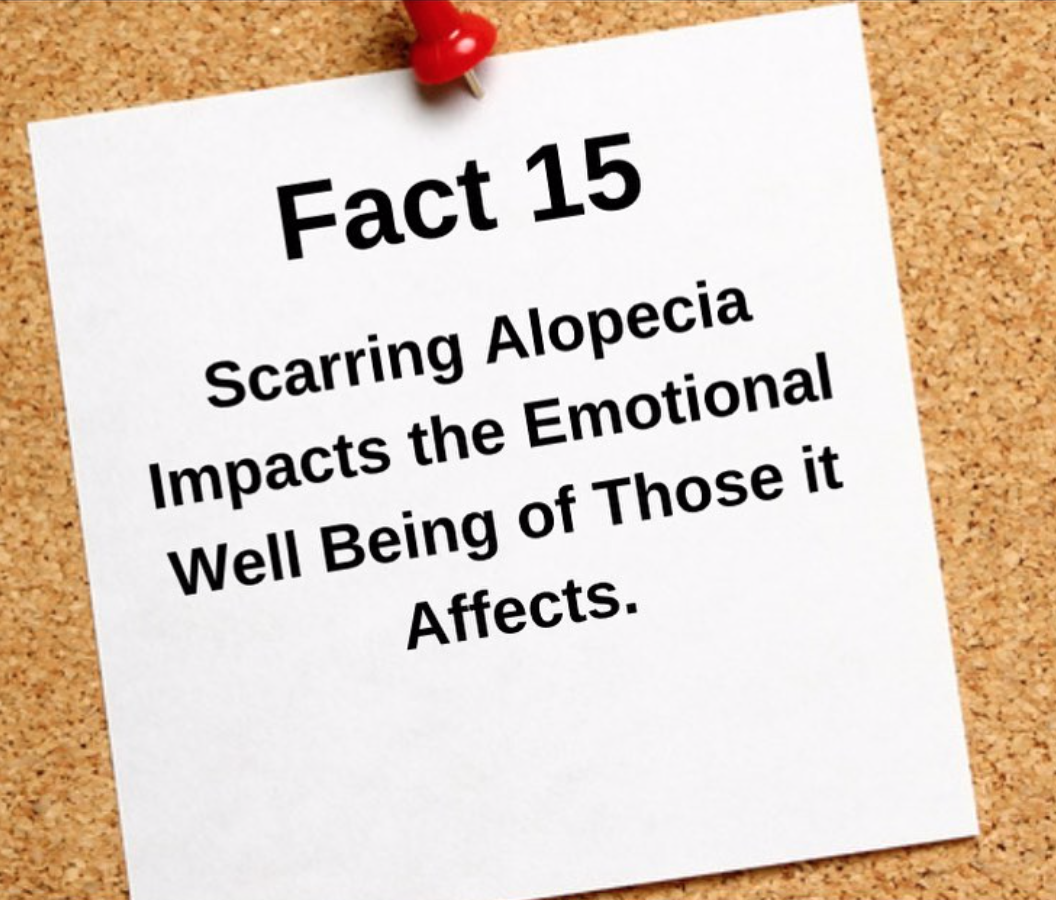National Scarring Alopecia Awareness Month (Day 15, Fact 15): Scarring Alopecia Impacts the Emotional Well-Being of Those it Affects.
Scarring Alopecia Impacts Multiple Aspects of Emotional Well-Being
Scarring alopecia has the potential to affect the way people feel about themselves. Symptoms of scalp itching, burning and tenderness can further impact the distress that patients feel. The chronic nature of the condition and often unpredictable course further contribute to the impact.
Studies have been conducted showing that lichen planopilaris, frontal fibrosing alopecia and central centrifugal cicatricial alopecia impact various aspects of emotional health and negatively affect quality of life. Of course, other types of scarring alopecias impact psychological well being too, it’s just that good studies have not been conducted.
Emotional Well-Being Among Patients with Lichen Planopilaris (LPP)
A 2019 study by Pedram Alirezaei & colleagues showed that compared to healthy controls, individuals with LPP report lower scores of self-esteem, physical functioning, and mental health. Depression scores were rated lower in individuals with LPP compared to controls. In individuals with LPP, a higher LPP disease activity and a higher severity of hair loss were associated with higher depression ratings and lower quality of life scores. Studies by Chiang and colleagues in 2015 were similar - showing that patients with more severe LPP disease activity tended to have worse depression scores.
Not all studies showed a higher rate of depression among patients with LPP. A 2018 study by Brankov and colleagues showed that fewer patient with LPP actually had depression compared with controls. The study involved 334 patients with LPP and demographic and health issues were compared to 78 control. Depression was identified inn 15.6 % of those with LPP compared to 28.9 % of controls. The result was statistically significant (p=0.018).
Emotional Well-Being Among Patients with Frontal Fibrosing Alopecia (FFA)
Among patients with frontal fibrosing alopecia, a 2018 study by Sacedo-Corralo and colleagues showed that 18.8% of FFA patients had moderate to severe anxiety and 6.3 % had moderate to severe depression symptoms. Patients with early onset FFA, more severe disease and those with troublesome scalp symptoms had worse levels of anxiety and depression.
Emotional Well-Being Among Patients with Central Centrifugal Cicatricial Alopecia (CCCA)
CCCA is known to affect quality of life. A 2021 study of 270 patients with cccA showed that 10% experienced anxiety and depression. This was similar to the rates of depression among patients with psoriasis and alopecia areata. It is not yet known if having CCCA truly alters the rates of depression given that some research in the past has shown a baseline rate of depression of around 10%.
Conclusions
As a global medical and patient community, we need to recognize the emotional impact of scarring alopecia. Like all the forms of hair loss, scarring alopecia also impacts self confidence, self identify and self esteem. Anxiety and depression are not uncommon. Further challenges come from the fact that troublesome symptoms are present in many patients with scarring alopecia and from the fact that finding accurate information and knowing what to expect in the future are difficult.
There is a great deal we can all do to help lessen the burden of scarring alopecia. We need to create more awareness so that everyone who battles these conditions feels they have a voice that will somehow and somewhere will be heard. We need to train our health care providers to rise to the challenge to diagnose and treat and support those wth scarring alopecia. Organizations like the Cicatricial Alopecia Research Foundation support patients with scarring alopecia and fund research. Other online groups provide a supportive community for some as well. For those who are negatively affected, we need to support and forester specific strategies that help patients improve their mental health.
References
Alirezaei P et al. Compared to Controls, Individuals with Lichen Planopilaris Have More Depression, a Lower Self-Esteem, and a Lower Quality of Life. Neuropsychobiology. 2019;78(2):95-103.
Brankov et al. Comorbid conditions in lichen planopilaris: A retrospective data analysis of 334 patients. Int J Womens Dermatol. 2018 Jun 7;4(3):180-184.
Chiang YZ et al. The role of beliefs: from a pilot study on illness perception, psychological distress and quality of life in patients with primary cicatricial alopecia. Br J Dermatol. 2015 Jan;172(1):130-7.
McKenzie S et al. Comorbid anxiety and depression among black women with central centrifugal cicatricial alopecia: a retrospective study. J Dematol 2021; 48: e19
Saceda-Corralo D, et al. Health-Related Quality of Life in Patients With Frontal Fibrosing Alopecia. JAMA Dermatol. 2018.
This article was written by Dr. Jeff Donovan, a Canadian and US board certified dermatologist specializing exclusively in hair loss.

